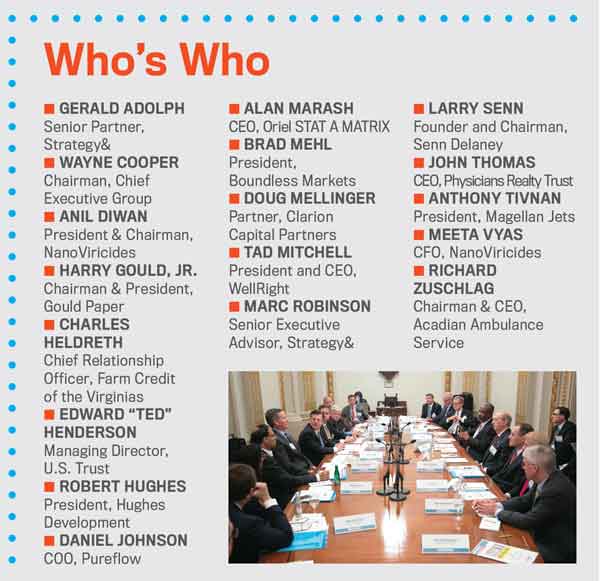Alan Marash, CEO of performance improvement consulting firm Oriel STAT A MATRIX, had a similar experience—but with the opposite result—when the company purchased a business that was also focused on performance improvement—but in the service arena as opposed to manufacturing, where Marash’s company had a strong foothold. “In hindsight, I think we made a tremendous tactical error of the important job of clearly defining the authority of the CEO who stayed on and perhaps trying to be too collaborative with her. It caused a great deal of disruption in the integration within the business and a lot of problems with staff.”
Even when the synergies seem right, cultural differences can blow up into major personnel issues, which is partly what happened to the Bank of America acquisition of U.S. Trust, said Ted Henderson, managing director at U.S. Trust. Mergers are difficult, as a rule, in financial services because the market is intensely competitive. “Bank of America had a different culture than U.S. Trust and I think it was a classic example where the best people at U.S. Trust decided they were going to be better off elsewhere.”
When a foreign acquirer is involved, cultural differences only intensify the challenge of integration. Gould Paper’s sale of a 51 percent stake to Japan Pulp and Paper in 2010 is a case in point. The merger gave the two companies, which had almost no overlap as far as suppliers and customers were concerned, the ability to cross-pollinate supply resources and achieve greater global reach. But the two had very different cultures and JPP, as the acquirer, needed to understand that it could not simply apply Japanese principles to an American company. “In Japan, as you know, nobody gets fired, nobody quits. It’s a job for life. So the concept of somebody being unhappy and maybe going to a competitor is beyond their capability to understand.”
The Need for Scale
Some mergers are doomed because they happen as a result of pressure from stakeholders responding to a current trend. When the economy recesses, for example, people want to retrench and consolidate rather than diversify or grow. That doesn’t necessarily mean the underlying deal is a good match. Higher costs of running a business can make consolidation necessary, too. “Like in banking, if you’re not big enough, with the new costs of regulation, you can’t survive, so you have to find somebody to buy you,” noted Larry Senn, founder and chairman of Senn Delaney, a Heidrick & Struggles global culture-shaping firm. “About a quarter of our work is around the cultural aspects of mergers and acquisitions, but I see another quarter as companies who never really did merge; they just came together and they’re still apart.”
In other cases, a company will bite off more than it can chew—and lose sight of the goal. Meeta Vyas, interim CFO of NanoViricides, recalled her time as CEO of Signature Brands, which was  acquired by Sunbeam under Al Dunlap’s management. “He did it exactly the wrong way,” she said, noting his purchasing three large companies in one day, without a solid plan for integrating them. “The second mistake he made was that I had gone around the company and rebuilt it in every way—and he never met me once after buying the company.”
acquired by Sunbeam under Al Dunlap’s management. “He did it exactly the wrong way,” she said, noting his purchasing three large companies in one day, without a solid plan for integrating them. “The second mistake he made was that I had gone around the company and rebuilt it in every way—and he never met me once after buying the company.”
Even with the best-laid plans, the integration can fail on the people end, said Doug Mellinger, managing director of Clarion Capital Partners, which has overseen numerous acquisitions by its portfolio companies. “For us, ultimately, it comes down to people and integration. Where we see these things just get murdered is if you don’t pick appropriate leaders.” By starting with a focus on capabilities, CEOs can not only choose the right partners but also ensure that they preserve what is special about the company they’re buying—not to mention their own.

Chief Executive Group exists to improve the performance of U.S. CEOs, senior executives and public-company directors, helping you grow your companies, build your communities and strengthen society. Learn more at chiefexecutivegroup.com.
0

1:00 - 5:00 pm
Over 70% of Executives Surveyed Agree: Many Strategic Planning Efforts Lack Systematic Approach Tips for Enhancing Your Strategic Planning Process
Executives expressed frustration with their current strategic planning process. Issues include:
Steve Rutan and Denise Harrison have put together an afternoon workshop that will provide the tools you need to address these concerns. They have worked with hundreds of executives to develop a systematic approach that will enable your team to make better decisions during strategic planning. Steve and Denise will walk you through exercises for prioritizing your lists and steps that will reset and reinvigorate your process. This will be a hands-on workshop that will enable you to think about your business as you use the tools that are being presented. If you are ready for a Strategic Planning tune-up, select this workshop in your registration form. The additional fee of $695 will be added to your total.

2:00 - 5:00 pm
Female leaders face the same issues all leaders do, but they often face additional challenges too. In this peer session, we will facilitate a discussion of best practices and how to overcome common barriers to help women leaders be more effective within and outside their organizations.
Limited space available.

10:30 - 5:00 pm
General’s Retreat at Hermitage Golf Course
Sponsored by UBS
General’s Retreat, built in 1986 with architect Gary Roger Baird, has been voted the “Best Golf Course in Nashville” and is a “must play” when visiting the Nashville, Tennessee area. With the beautiful setting along the Cumberland River, golfers of all capabilities will thoroughly enjoy the golf, scenery and hospitality.
The golf outing fee includes transportation to and from the hotel, greens/cart fees, use of practice facilities, and boxed lunch. The bus will leave the hotel at 10:30 am for a noon shotgun start and return to the hotel after the cocktail reception following the completion of the round.